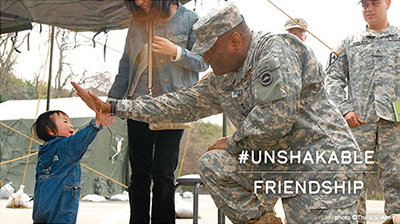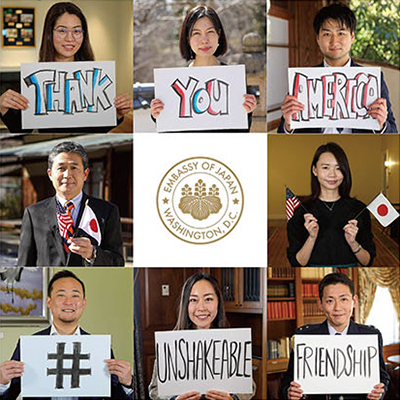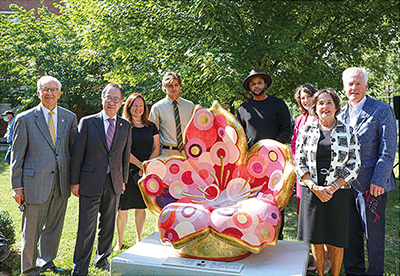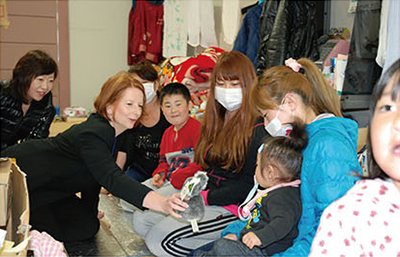Diplomatic Bluebook 2022
Special Feature
10 Years Since the Great East Japan Earthquake
10 years ago on March 11, 2011, Japan was struck by an unprecedented disaster. In the Great East Japan Earthquake, more than 20,000 lives were lost from the earthquake and tsunami. The processing of the accident at the Tokyo Electric Power Company (TEPCO)'s Fukushima Daiichi Nuclear Power Station is still ongoing to this day.
Immediately after the earthquake struck, Japan received countless amounts of support and encouragement from all over the world. In addition to receiving relief supplies and monetary contributions from many countries and regions, people from around the world also rushed to the affected areas to help search for missing persons and provide support to those who were in need. Many Japanese people felt a strong bond (“kizuna”) with countries and regions around the world.
10 years after, there are still residents who are living in evacuation shelters, and challenges remain in the path toward reconstruction. However, the affected areas are steadily moving forward through reconstruction support, and their bonds with the world are becoming stronger than ever before.
For example, import restrictions on Japanese food products, imposed by 55 countries and regions after the TEPCO's Fukushima Daiichi Nuclear Power Station accident, have been removed by 41 countries and regions as of the end of 2021. The volume of agricultural, forestry, and fishery exports from Fukushima Prefecture returned to pre-earthquake levels in 2017 and has since recorded historical highs for three consecutive years. (See Chapter 3, Section 3, 4(3) on page 300 for details on the import restrictions placed by each country on Japanese food products.) It is extremely regrettable that there are still countries and regions maintaining import restrictions on Japanese food products even a decade after the disaster. MOFA is requesting these countries and regions remove the restrictions as soon as possible based on scientific evidence, as well as working toward expanding the export of Japan's agricultural, forestry and fishery products.
Efforts are also ongoing to develop hubs for international intellectual exchanges and business, as well as hubs that can serve as the source for innovation. This includes the Fukushima Hydrogen Energy Research Field, a research and development center for hydrogen and renewable energy.
Furthermore, over the past 10 years, Japan has utilized the lessons drawn from the Great East Japan Earthquake toward further strengthening international cooperation on disaster risk reduction (DRR), which it had already placed great importance on since before the disaster. In 2015, Japan hosted the Third UN World Conference on Disaster Risk Reduction*1 in Sendai where it advanced the concept of “build back better” as a commitment shared by the international community. Japan contributed to incorporating the vision of DRR into the Sustainable Development Goals (SDGs). Japan also took the initiative for the adoption of the UN General Assembly resolution on World Tsunami Awareness Day in the same year, thus endeavoring to promote DRR education internationally. In recent years, natural disasters have become more intense, with extreme weather events becoming more frequent due to climate change. In light of this, Japan is working to further strengthen international cooperation through DRR.
The following is an introduction to various initiatives implemented by MOFA in 2021 to mark the 10 years since the Great East Japan Earthquake.
- 1 Third UN World Conference on Disaster Risk Reduction
https://www.mofa.go.jp/ic/gic/page3e_000305.html
1 Statement by the Foreign Minister, and Commemorative Events Held in Countries/Regions Worldwide
On March 11, 2021, which marked 10 years after the Great East Japan Earthquake struck, the Foreign Minister issued a statement*2 to convey the status of steady reconstruction progress in the affected areas, as well as to express gratitude to countries and regions around the world. Commemorative events marking 10 years after the earthquake were also held in 2021 in countries and regions that have sent their warm support and encouragement to Japan from the time immediately after the earthquake till the present day. (See the Column on pages 331, 332 or 333.)
- 2 Statement by the Foreign Minister
https://www.mofa.go.jp/press/release/press1e_000178.html
Commemorative Events to Convey Gratitude and Messages of Friendship to Countries/Regions Around the World
– A Friend in Need is a Friend Indeed
(1) Report from Japanese Diplomatic Missions in the U.S.
In March, Japanese diplomatic missions in the U.S. came together as one to hold a series of events to express Japan's gratitude to the U.S., which has provided a lot of support toward reconstruction and recovery since the Great East Japan Earthquake.
The events adopted “Unshakable Friendship” as their common slogan. This slogan resonated with many people and was widely used across U.S. government agencies, renowned organizations, and the general public. Video messages expressing gratitude from those in the affected areas and embassy staff were played a total of about 2 million times and shared widely.Note1 In addition, on March 11, marking 10 years since the disaster, a full-page advertisement was published in U.S. paper, The New York Times, with a message of gratitude for the support, including “Operation Tomodachi,” conducted by the U.S.
Furthermore, the Japanese Embassy in the U.S. produced cherry blossom sculptures in cooperation with local artists, so as to express gratitude to the U.S. once again in the milestone decade since the Great East Japan Earthquake. In March, the sculptures were set up in Washington D.C. to coincide with the National Cherry Blossom Festival held in the springtime every year. After the exhibition was concluded, the sculptures were donated to universities that have deep ties with Japan and other relevant organizations, and have now become a familiar symbol of Japan's gratitude and Japan-U.S. friendship to many citizens.
The series of events were mainly held online due to the impact of the COVID-19 pandemic. However, Japan-U.S. friendship, which has continued throughout such difficult periods, truly embodies the saying “A friend in need is a friend indeed,” and resonated with many people.
 Logo for the common slogan
Logo for the common slogan Social media postings by embassy staff expressing their gratitude to the U.S. (from the Instagram account of the Embassy of Japan in the United States of America)
Social media postings by embassy staff expressing their gratitude to the U.S. (from the Instagram account of the Embassy of Japan in the United States of America) Attendance by Ambassador Tomita (second from left in the photo) and others at the presentation ceremony of the cherry blossom sculpture to Randolph-Macon College in Virginia, the alma mater of Taylor Anderson who died in the tsunami. Ms. Anderson had been a teaching assistant at a school in Ishinomaki City, Miyagi Prefecture, when the disaster struck.
Attendance by Ambassador Tomita (second from left in the photo) and others at the presentation ceremony of the cherry blossom sculpture to Randolph-Macon College in Virginia, the alma mater of Taylor Anderson who died in the tsunami. Ms. Anderson had been a teaching assistant at a school in Ishinomaki City, Miyagi Prefecture, when the disaster struck.- Note1 See below for details on the “Unshakable Friendship” project
https://www.us.emb-japan.go.jp/jicc/events/unshakable-friendship.html

Commemorative Events to Convey Gratitude and Messages of Friendship to Countries/Regions Around the World
– A Friend in Need is a Friend Indeed
(2) Report from the Embassy of Japan in Australia
10 years have passed since the day that is remembered so vividly by the Japanese. Following the disaster, Japan was very fortunate to receive support from all over the world. Australia was among the countries that moved extremely quickly to provide assistance, beginning with then-Prime Minister Julia Gillard's visit to the Tohoku region immediately after the earthquake struck, and extending to the transportation of food and high-pressure water pumps by the Australian Defence Force, and search and rescue efforts by the police, fire and ambulance services. Australia's assistance was not limited to just emergency support. Since 2012, it has also been conducting a homestay program, inviting junior and senior high school students who lost one or both parents in the disaster to stay with families in Australia. This program has been conducted every year since, but has been temporarily suspended as of March 2022 due to the impact of COVID-19.
In April, with the aim of conveying Japan's gratitude, the Embassy of Japan in Australia invited about 200 Australians who had engaged in recovery efforts, including members of rescue teams engaged in emergency support and host families who hosted Japanese students to the Ambassador's residence. In her video message for the event, then-Prime Minister Gillard emphasized the stoicism and resilience she had observed among the survivors in the disaster areas. Those who had participated in homestays in Australia (senior high school students at the time of their homestays) kindly thanked their host families, while one of them stated in a matter-of-fact way that he has no memory of the first couple of years following the disaster. Guests to the event enjoyed food produced in the affected areas as well as quality Japanese sake from the Tohoku region. Australia does not currently impose any import restrictions on Japanese food produce. Its continued support immediately after the earthquake and thereafter speaks of the maturity of mutual understanding and trust between the two countries. In the opening remarks delivered at the reception, Ambassador Yamagami repeatedly stated that Japan will never forget what Australia has done for Japan.
 Visit by Prime Minister Gillard to Minamisanriku Town (April 2011) (Photo: Minamisanriki Town)
Visit by Prime Minister Gillard to Minamisanriku Town (April 2011) (Photo: Minamisanriki Town)